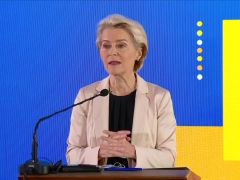The Government of Republika Srpska delivered its 16th Report to the United Nations Security Council yesterday. The report advises the Council on the Entity’s positions on a range of issues relevant to the international community’s involvement in BiH. The executive summary of the report is below.
Introduction and Executive Summary
Republika Srpska (RS), a party to all of the annexes that comprise the Dayton Accords, respectfully submits this 16th Report to the UN Security Council, which outlines the RS Government’s views on key issues facing Bosnia and Herzegovina (BiH). Among the issues examined in this Report are the SDA Party’s efforts to create a crisis in BiH, Republika Srpska’s defense of its constitutional and legal rights, and reforms necessary for BiH’s EU integration.
I. The SDA has sought to create a crisis in BiH and undermine security, functionality, and inter-Entity/inter-ethnic cooperation
Section I of the report examines how the largest Bosniak party, the SDA, has tried to subvert security, functionality, and cooperation in BiH. The SDA has tried to provoke a crisis by attacking Republika Srpska’s legitimacy through its effort to ban the commemoration of the date of Republika Srpska’s founding (Republic Day) and by threatening violence. The SDA has also tried to use the BiH Chief Prosecutor for a political prosecution of RS President Milorad Dodik.
The SDA’s recent attempt to provoke a crisis is part of a broader pattern of undermining BiH’s security, functionality, and cooperation between Entities and ethnicities. For example, the SDA held much-needed IMF financing hostage in a baldly political effort to extract unrelated concessions from Republika Srpska. The SDA also exerts improper influence of the BiH Prosecutor’s office and helps prevent prosecutions of war crimes with Serb victims. Moreover, the SDA is continuing to block judicial reforms necessary for EU integration. The SDA this year pressured the director of the BiH Statistics Agency into unlawfully imposing a program for the BiH census that inaccurately inflates census results for political objectives.
In addition, the SDA has helped turn BiH into a sanctuary for jihadists, who pose a serious threat to BiH, Europe, and the rest of the world. The SDA, an Islamist party, invited the mujahidin to Bosnia and Herzegovina during the war and has continued its close ties to radical Islamists. The BiH Prosecutor’s Office has failed to seek justice for mujahidin atrocities against Serbs. In addition, BiH’s SDA-dominated security apparatus is failing to curb the jihadist presence in BiH, and the international community’s support of the SDA unintentionally increases the risk of terrorism.
II. Republika Srpska will continue to defend its rights under BiH’s constitution and laws.
Section II of the report explains some of the ways in which Republika Srpska is defending its legal rights under the Dayton Accords and other law in order to maintain the political structures and peace established by the treaties. On the 2 October 2016, RS voters gave a sweeping victory to the parties of Republika Srpska’s governing coalition, sending a strong message of support for the RS Government and its policies, including its economic reforms and its staunch protection of Republika Srpska’s rights under the Dayton Accords.
RS voters also took part, on 25 September 2016, in a referendum about the date of Republika Srpska’s Republic Day holiday, voting overwhelmingly in favor of retaining the current date. The referendum, despite feverish claims by SDA officials, had nothing to do with BiH’s territorial integrity and was fully in accord with applicable law. The referendum was a step toward implementing the BiH Constitutional Court’s November 2015 decision on Republic Day, which, as this report explains in detail, cannot reasonably be interpreted to forbid Republika Srpska from observing the date of its founding. If the Court were to consistently apply such a position, every other public holiday in BiH would be unconstitutional. The RS National Assembly will soon enact amendments to the RS Law on Holidays to implement the BiH Constitutional Court’s decision.
Section II also explains why the BiH census results published on 30 June 2016 are inaccurate and legally invalid. The results were published on the basis of a faulty program of data processing that was adopted unilaterally by the Director of the BiH Agency in direct violation of the BiH Census Law, under unlawful influence of the BiH Chief Prosecutor.
III. EU Integration
Section III reiterates Republika Srpska’s strong support for BiH’s integration into the EU and examines the reforms that are necessary for continued progress. Republika Srpska continues its vigorous efforts to bring BiH closer to the EU, including by implementing the EU-sponsored Reform Agenda.
EU integration, however, also requires significant reforms to BiH’s judicial and prosecutorial institutions. The BiH Prosecutor’s Office must end its long pattern of discrimination against Serb victims of war crimes. A recent report by the Organization for Security and Cooperation in Europe helps explain how the BiH Chief Prosecutor controls war crimes prosecutions and protects his allies. The RS Government has continued to seek reforms to BiH’s justice system through the EU’s Structured Dialogue on Justice, but progress has been impeded because SDA members and other Bosniak officials have fiercely opposed reforms that EU experts have made clear are necessary. Another necessary judicial reform is to the BiH Constitutional Court, which has been plagued by political influence and, as currently constituted, is incompatible with BiH’s EU membership. The presence of foreign judges on the court was only intended under the BiH
Constitution as a provisional measure; their continuation is inconsistent with BiH’s sovereignty and democracy and undermines the court’s legitimacy. BiH, moreover, cannot become an EU member until its justice institutions are reformed to stop their abuse of power for political advantage.
EU integration also requires closing OHR and ending the UN Security Council’s invocation of Chapter VII of the UN Charter.
As the RS continues to pursue reforms to improve its economy and advance EU integration, it asks members of the international community to respect the Dayton Accords and support local reform initiatives in BiH. The RS believes BiH can be a stable and successful part of Europe if the Dayton structure is respected.


